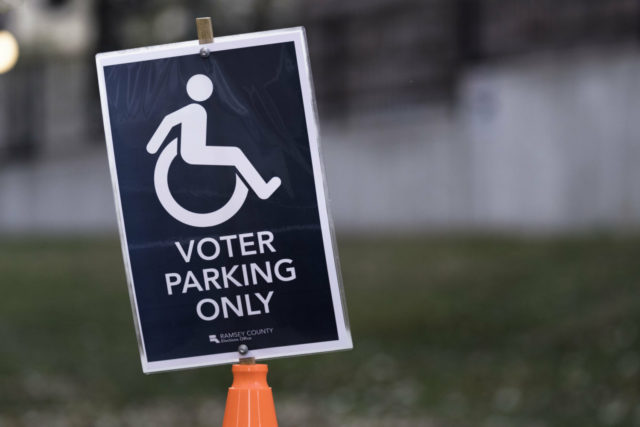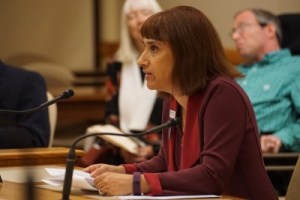
Republican lawmakers in the Wisconsin State Legislature introduced a series of bills earlier this year with the aim of scaling back the use of absentee voting in future elections.
Several provisions to the introduced legislation left critics concerned that the proposals could disenfranchise elderly, disabled and indefinitely confined voters should they be enacted into law.
SB203, SB204 and SB205, for instance, would require disabled voters under 65 to acquire a doctor’s note confirming their “indefinitely confined” status and display a photo ID to vote, demand voters reapply for an indefinitely confined status every two years, ban anyone who is not an immediate family member or a singular designated individual from delivering an immobilized voter’s ballot and charge election officials with a felony if they send absentee ballots or absentee ballot applications to voters who have not made a request to vote absentee.
Additional provisions would seek to eliminate absentee ballot collection events, limit absentee ballot drop boxes to one per municipality and prevent staff working in assisted care facilities from encouraging electoral participation.
The flurry of restrictive voting legislation was defended by co-author Sen. Duey Stroebel (R-Saukville), who insisted his proposals were intended to ease concerns among his constituents regarding what he described as potential irregularities in Wisconsin’s electoral process during last year’s election.
“Wisconsinites grew skeptical of the integrity of our elections,” Stroebel said in an email statement. “Republican lawmakers heard those concerns, and we have passed common-sense legislation to strengthen public trust in the elections process and the outcomes produced by our elections.”
Despite claims made by Stroebel, a recount of the 2020 Wisconsin election results–conducted at the request of the Trump campaign–confirmed President Joe Biden’s victory in the state, and no substantial evidence of widespread absentee voter fraud was uncovered in the state.
The emphasis placed on photo ID requirements drew the ire of disability and voting rights advocates across the state, including Disability Rights Wisconsin (DRW) Milwaukee Office Director, Barbara Beckert.

Beckert said a significant portion of disabled voters cannot operate vehicles or do not possess a driver’s license, hindering their ability to procure an ID from the Wisconsin Department of Motor Vehicles and prompting her organization to release a letter urging the state to improve upon existing options to obtain a photo ID.
“So many people with disabilities are non drivers,” Beckert said. “Lack of access to transportation is a huge barrier, not only in going to vote, but Wisconsin has one of the most restrictive photo ID laws in the country. People with disabilities often don’t have a driver’s license. DMV hours of locations are very limited. Getting there to get a photo ID can be a very high bar.”
DRW is a member of the Wisconsin Disability Vote Coalition (WDVC), a collaborative effort
launched by the Wisconsin Board for People with Developmental Disabilities (BPDD) and DRW which focuses on disabled voter outreach and education.
Beckert said the bulk of the WDVC’s voting assistance efforts in 2020 centered around ensuring disabled voters could access transportation to dropboxes or find individuals to deliver their ballots.
“In some of the big elections last year, we reached out to different groups in the aging and disability community around the state and invited them to share information about what local resources were available that might be providing transportation, and then we’d had a database on our website where people could look by municipality or county and find what transportation was available,” Beckert said.
As the Legislature takes aim at dropping off absentee ballots, however, Beckert said she worries groups working with the WDVC will face greater difficulties while working to protect ballot access for disabled, elderly or indefinitely confined Wisconsinites, should the introduced bills become law.
Similar concerns were expressed by Wisconsin Democracy Campaign Executive Director, Matt Rothschild, who said he fears limiting who is allowed to return a completed absentee ballot on behalf of a disabled voter could present logistical issues for indefinitely confined voters and lead to widespread disenfranchisement.
“They [disabled voters] can only assign it [dropping off a ballot] to a specific person, and that person cannot deliver more than two absentee ballots for anybody in the whole state,” Rothschild said. “If they have a direct relative in Wisconsin, they have to ask that relative to deliver the ballot. They can’t ask anybody else. So, say you’re in Madison, and your only direct relative is a brother living in Superior. They’re probably not going to drive down from Superior to help you deliver a ballot.”
For the time being, voting rights groups need not worry about the prospect of the state government implementing a bill limiting absentee voting. Gov. Tony Evers, a Democrat, is expected to veto bills proposed by the GOP-controlled legislature to curtail absentee voting, but the potential still looms for a Republican administration to further restrict ballot access in 2024 and beyond.
Next year, Evers will run for a second term as governor in a hotly contested battleground state. Should he lose his reelection bid and the Republican Party maintains control of the legislature, it is entirely plausible, if not likely, that conservatives will reintroduce and reimplement any voting legislation blocked by Evers this term.
Even if Evers defeats his opponent in 2022, Republicans in the State Legislature only need to pick up one Senate seat and four assembly seats to build the veto-proof majority needed to enact their proposals.
While Democrats working in other Republican-controlled legislative bodies, such as Texas have the ability to stall a floor vote on legislation through walking out and denying a quorum, Wisconsin State Legislature rules do not grant the minority party the ability to pursue a similar course of action.
A successful election cycle for the GOP next year would leave Wisconsin’s liberal legislators in a bind, practically guaranteeing a slew of new election laws may be implemented ahead of 2024, yet Democrats hope to change their fortunes in 2022 through the redistricting process following the census of 2020.
Democratic Sen. Chris Larson (D-Milwaukee) acknowledged his party could do very little to block Republican election law bills should the party expand its legislative majority, he expressed hopes the judicial system could alter districts drawn by conservatives through mounting a successful legal challenge to what Democrats view as a gerrymandered electoral map.
“If it gets to that point [of an expanded GOP majority], there is nothing that the legislature would be able to do to stop it,” Larson said. “The only thing that could happen is if there’s a court challenge, if there’s a lawsuit that’s brought. Then [the outcome of] that would depend on if it’s a state court or federal court, and then it depends on the political leanings of the judge, or the panel of judges, whichever is the case.”
Legal challenges have been the modus operandi for grassroots and legal organizations looking to challenge election laws.
In 2011, the American Civil Liberties Union (ACLU) sued then-governor Scott Walker in response to a voter ID law the organization claimed violated the Voting Rights Act and the Fourteenth Amendment.
In 2020, Beckert said DRW joined a lawsuit alleging the state did not comply with the Americans with Disabilities Act through failing to provide indefinitely confined voters with adequate access to absentee ballots.
“Wisconsin is one of a declining number of states who don’t have an accessible absentee ballot and don’t provide equitable access to absentee voting for people who require assistive technology to vote privately and independently,” Becker said “So that and some other ADA provisions were in that lawsuit.”
Facing the possibility of a new slate of absentee ballot restrictions in the coming years, DRW is gearing up for potential legal battles in 2023 and beyond.
Beckert said her organization is ready to dispute various provisions to the legislature’s absentee voting bills, but she remains optimistic that Congress will act to enshrine greater protections for disabled voters into national law.
“First and foremost, we have a legal strategy to see if there’s any way to go to court and get some of these new barriers and restrictions addressed through the legal system,” Beckert said. “We’ve also hoped that we would see more regulation and oversight on the federal level to ensure more consistency on voting rights, including for voters with disabilities.”
Larson expressed similar hopes for legislative change federally; encouraging Wisconsinites to cast their ballots for candidates who opposed what he described as restrictive voting laws in circulation.
Larson said legal action may not prove necessary, as citizens currently possess the ability to counteract an agenda with which they disagree at the voting booth.
“Law is on the side of people being able to vote, it is not on the side of those who are trying to shut that down and trying to form a barrier,” Larson said. “That’s the point. They’re just trying to add confusion. The challenge [to absentee voting] is by design, and the only way that challenge is eliminated is by voting for people who want to actually hear your voice.”



























